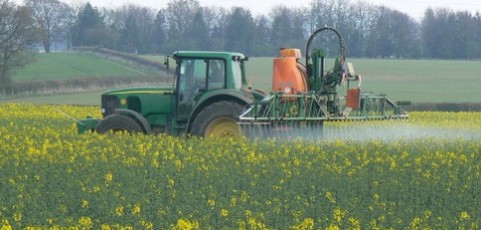
The revelation that large quantities of nanomaterials are being used in agricultural chemicals in France has brought into serious question claims made by the Australian Pesticide and Veterinary Medicines Authority (APVMA), that nanomaterials are currently not being used in agricultural chemicals in Australia.
France is the first country globally to have adopted a mandatory register of nanomaterial use. Its 2013 statistics, released late in 2014, show that nearly 500,000 tonnes of nanomaterials were produced or imported into France in 2013. Over 58 per cent of the notifications made were for nanomaterials used in agriculture, forestry and fisheries.
This level of use provides overwhelming evidence that the large chemical companies are now using nanomaterials widely in commercially available agricultural chemicals. The APVMA’s claim that there is no evidence of the use of nanomaterials in Australia because no one has applied for regulatory approval is untenable.
The APVMA needs to actively and urgently investigate the extent and nature of nanomaterial use in agricultural chemicals and whether chemical companies have breached regulations in failing to apply for approval of these new forms of chemicals. Parliament needs to investigate the complete failure of the APVMA to cope with this emerging and risky industry.
These nano-chemicals are being used on the food all of us eat and the APVMA cannot possibly know whether these foods are safe for us to eat or farmers to use because the necessary studies have not been done and are not even required by our regulators. A recent review concluded that research into the effects of nanomaterials in agricultural chemicals is so limited that the “the risk posed to humans consuming these food products is completely unknown.”
There is, however, significant evidence that nanomaterials can cause harm throughout the food chain. Studies have shown that nanomaterials can potentially harm beneficial soil microorganisms, plants, nematodes and earthworms and prevent nitrogen fixation, and that plants can take up nanomaterials from the soil into their edible tissues and fruits. Scientists have argued that plant species exposed to nanomaterials may over time undergo morphological, physiological, genetic, and epigenetic changes that may ultimately affect crop growth, yield, or nutritional status.
The rapidly expanding use of nanomaterials will invariably lead to their accumulation in soil, water and food.
The risks associated with the use of nanomaterials in agricultural chemicals spring from the same properties that make them appealing to chemical companies – they are much more chemically reactive, often more toxic and more persistent, spread more evenly on plant surfaces and are able to cross biological membranes. Unfortunately, the APVMA has turned a blind eye to these risks and allowed commercialisation to occur with no nano specific regulatory structure in place.
Friends of the Earth Australia is calling for an immediate moratorium on the use of nanomaterials in agricultural chemicals, pending full safety assessments, and the establishment of our own nano-register in order to allow the tracking of these materials through the food chain.
Fonte: FoE
